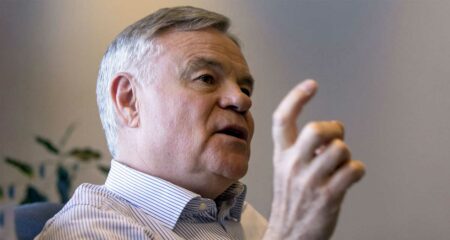
Naspers Group is making its CEO a very rich man. Bob van Dijk received almost R1.9-billion in salary, incentives, and vested share options and shares appreciation rights in the year to March 2019, a regulatory filing published on Friday shows.
He received the equivalent of about R180-million in base pay, pension and incentives in the 2019 financial year. In addition, more than 290 000 Naspers N share options became vested to Van Dijk with a release value of R955.4-million. About $56.1-million (R781.1-million at the time of writing) worth of share-appreciation rights (SARs) also vested, for a total of more than R1.7-billion.
Of course, that’s not money in the bank until he exercises those options and SARs. However, during the year, he realised a gross gain from exercising Naspers N share options of R26-million and a further $14.9-million (R207.5-million) from the Flipkart share appreciation plan.
The group’s remuneration report for the 2019 financial year shows Van Dijk received a total of US$12.9-million in remuneration, including $10.4-million in long-term incentives (LTIs). The LTIs are calculated at fair value based on the estimated value of the option on grant date — the actual value accruing to him will depend on the “real value created over the term of the option”.
Van Dijk’s base salary amounted to $1.26-million, down from $1.33-million, though the decline was the result in the depreciation of the US dollar relative to the euro — he is paid in euros and received a 10% salary increase.
His short-term incentives rose from $1.06-million to $1.11-million, while remuneration under the LTI plan rose from $9.64-million to $10.37-million (fair-value estimate).
CFO remuneration
Chief financial officer Basil Sgourdos saw his remuneration leap from $3.53-million to $7.48-million on the back of a big jump in short- and long-term incentives received. Under the LTI plan, he received $5.46-million (fair-value estimate), up from $1.95 in the 2018 financial year.
Naspers has made several changes to its remuneration policy in 2019, including a minimum shareholding requirement for the CEO of 10 times annual salary, which Van Dijk met in both the 2018 and 2019 financial years.

It has also improved disclosure, with a clearer link between strategy, performance, remuneration design and remuneration outcomes. For short-term incentives, this includes more information on performance goals and level of achievements.
To avoid shareholder dilution under the LTI plan, Naspers has implemented a share purchase programme. The annual cost of this in the 2019 financial year was $78-million, up from $22-million in 2018.
Naspers chairman Koos Bekker received $575 000 (R8-million) in director’s fees, up from $549 000 in 2018. — © 2019 NewsCentral Media




